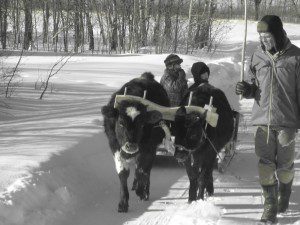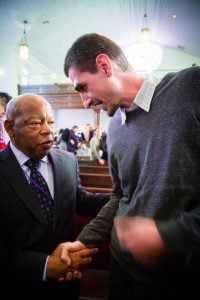One of the gifts of my work with School for Conversion is that I get to meet and hear from folks who are getting caught up in the “everyday awakening” that’s happening all around us. For so many of those folks, this entails a journey into community. Marcus Rempel, our guest columnist today, writes about his experience at Plowshares Community Farm outside of Winnipeg, MN. I’m looking forward to visiting them in a few weeks. If you’d like to learn more about the community there, you can contact Marcus at [email protected].
Toward the very end of Judah’s existence as a kingdom, when its defensive and diplomatic stratagems were all played out, the prophet Jeremiah hoisted the yoke of an ox to his shoulders and walked the streets of Jerusalem, in a dramatic enactment of Judah’s future. People were appalled.
I think about this story as I lay the yoke across the growing shoulders of Oscar and Jonah. The very idea of working a team of oxen on a “first world” farm in the twenty-first century is an affront to the narrative of progress.
The official court prophet Hananiah grabbed the yoke from Jeremiah’s hunched shoulders and angrily broke its bars. Jeremiah’s “word from the Lord” predicted a future of servitude under the Babylonian Empire. Hananiah’s “word from the Lord” insisted that any such humbling would be brief; that Judah’s manifest destiny was to carry on the Davidic line in an unbroken trajectory of growth and success. Servitude could never define the throne of David. It was unthinkable that the Lord could let a son of David – his Anointed One – suffer the humiliation predicted by Jeremiah. History (and Jesus) showed Jeremiah the true prophet.
Last week, as thousands gathered on the White House lawn for the largest climate change rally in history, Oscar and Jonah hauled their first loads of hay together here at Ploughshares Community Farm, a small intentional community on the banks of the Brokenhead River in eastern Manitoba. They looked pretty sharp. We have a long way to go before we unhitch this farm from fossil fuels, but they helped us take our foot off the gas at least a little bit, and I love them for it.
We’re a pretty mixed bunch here at Ploughshares, but I think that each in our own way can identify with Jeremiah’s moment: a moment of decline, a moment of reckoning. We have lost faith in the grandiose project, the big dream; whatever is beautiful in our future will have to be small. We are cautious to declare a “word of the Lord” in any of this. We are aware of many competing “words of the Lord” clamouring to be heard in these times. When we do pray together as a community, we pray in silence.
Some of us go to church, some of us don’t. The little Anglican church where I worship is in its own moment of decline and reckoning. Jesus’ word about being present “wherever two or three of you are gathered…” is becoming increasingly acute there. Were it not for our priest, a kind old draft dodger from Texas, preaching a gospel that is consistently humble, hopeful and honest, I’d have dropped out by now, too. Many of my favorite people out here are church-averse. At best, they see the church as irrelevant to their lives; for many, it has been a place of humiliation and wounding. Many of our friends out here are gay. And then there are our conservative Christian friends in the neighbourhood – dear, warm-hearted folks still beholden to a theology that condemns these friends to non-being in this life or everlasting torment in the next.
James Alison, my new favourite theologian, writes that any theology not done in the space of a “heart-close-to-cracking” is probably off the mark. Ploughshares is a good place to enter that space. In simplest terms, we are trying to cultivate blessed friendship and food here, to eat and drink “worthily” as the New Testament puts it. To do this, Paul says we have to discern the body or we eat and drink damnation unto ourselves. It is easy to see the failures of communion, the damnations in the culture wars and the climate crisis. How to embody the beloved community in a way that does not shun and exclude, how to eat without stealing, how to farm without polluting?
Oscar, our “off” ox (the more mature, well-trained worker on the outside of the team) was named for Romero, a bookworm turned prophet of the poor, a priest sacrificially brave against systemic exploitation. Jonah, our “nigh” ox (the newer recruit, the one to keep close) is named for a prophet who discovered an expansiveness of mercy far beyond his imaginings.
There’s a long tradition of folktales where fools set out on adventure and succeed despite their ignorance, because they let their beasts of burden choose the way. Maybe Oscar and Jonah will help us find ours.












